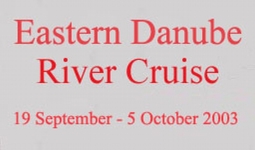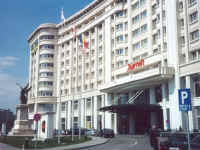Wednesday, 24 September. We didn't have to have our luggage
out until 9:30, so we ate breakfast first. The bus left for the airport at 11:00
for our 1:40 flight to Bucharest. We got there at 4:15 (after losing an hour due
to the time change). Again there was a long wait at the airport while the Grand
Circle representative collected passengers from different flights. It was nearly
6:15 before we got to the Bucharest Marriott Grand Hotel.
This is the largest hotel in Romania. It is housed in what Nicolae
Ceausescu, former Communist dictator
of Romania, intended to be a grand-scale guesthouse, part of his grandiose public building scheme that
destroyed much of old Bucharest. It was not completed before his execution in 1989, and the shell was
taken over by Marriott and completed as a 402-room, five-star hotel. It is well-situated and the
accommodations were excellent.
From our room we had a good view of the Parliament Building, a huge
architectural monstrosity dreamed up by Ceausescu, who called it the Hall of the People.
The bus was supposed to take us to dinner at 6:30 but, because we had arrived at the hotel only shortly before that, it left at 6:50. Two more teams (yellow and green) had been added, and the original blue and red teams each had several more people added. So now there were four buses for the entire group of 134 people. (There normally would have been about 170, but some had canceled when informed of the low water level in the Danube.)
We were driven to the Restaurant Pescarus where we enjoyed a too generous Romanian meal in the
"garden." The aperitif was followed by a course of six "mixed starters," very similar to Turkish
meses,
but much larger. That alone was a filling meal, but it was followed by an unbelievably large cabbage
salad, goulash with a gigantic piece of polenta, and a big slice of an ice cream roll. Of course, there was
plenty of wine, then coffee at the end.
There was also entertainment before and during the meal. For the first 20 minutes or so after we were
seated, a group of a dozen strolling musicians played American golden oldies, and we were afraid there
wouldn't be any Rumanian music. But they finally switched to folk music. Then a group of a ten dancers
in native costumes came out and performed lively folk dances on the small outdoor stage. They were
excellent. Afterwards the strolling musicians resumed their rounds until 9:00 when it was time for us to
leave. (Most of the group had flown in from the U.S. that morning and were exhausted.) We were back
at the Marriott about 9:30.
This was to be our only night in Bucharest, so a brief look at its history is in order. Although there were earlier settlements here, the site first gained importance when the rulers of Walachia moved there in the 14th century. Vlad III (Dracula) built a citadel there in the 15th century to ward off invading Turks, but they eventually captured it and made it the Ottoman capital of Walachia in 1659. When Walachia and Moldavia were joined to form the new Romanian state in 1862, Bucharest became the capital. Romania attained its present size in 1920 when, as a reward for being on the winning side in World War I, it was allowed to annex Transylvania from Hungary. A further word about Draculca: Vlad III ruled Wallachia three separate times (1448; 1456-1462; and 1476). He achieved renown as a successful fighter against the Turks. He gained the name Vlad Tepes (Vlad the Impaler) because his favorite method of executing his enemies was to impale them on a wooden stake, a practice that was by no means unique to him in those days. Romanians view him as a national hero and a key figure in the evolution of the country's independence. One of our Romanian guides told us how Vlad III supposedly got the name Dracula. His Father, Vlad II, had also been a successful fighter against the Turks, for which he was awarded the Order of the Dragon. Thus he was called Vlad Dracul Vlad of the Dragon. A Romanian student informed me that the final "a" was added by Westerners. I also found that on the Internet in Romanian "drac" means "devil" (e.g., "Dudevilte dracului" means "Go to the devil."). So the name Dracula also has a devilish connotation in Romanian.
Copyright © 2000-2023 DarrellPeck.com All rights
reserved. | |||||||


